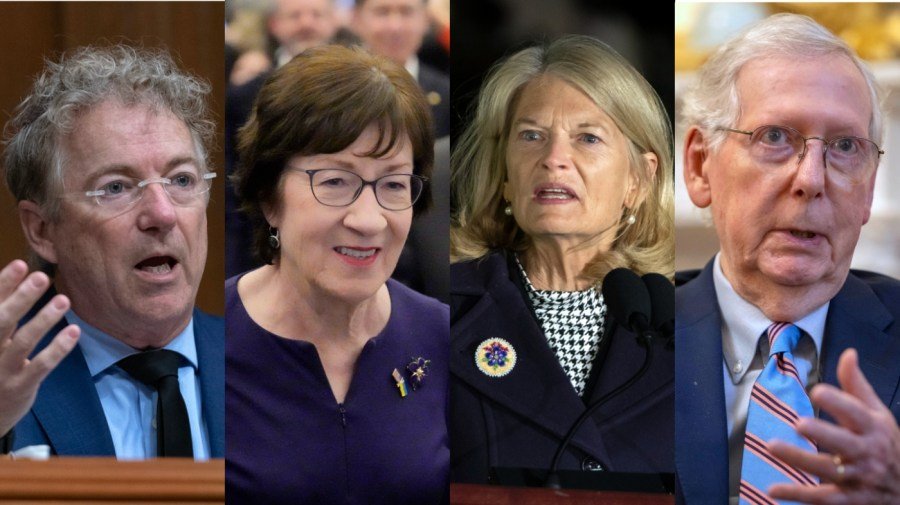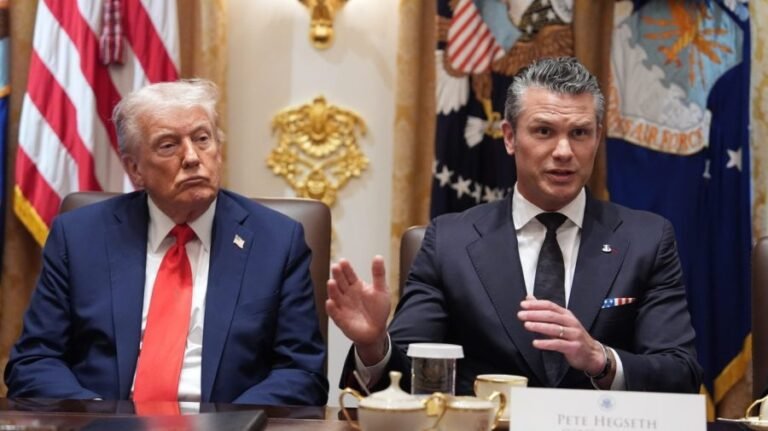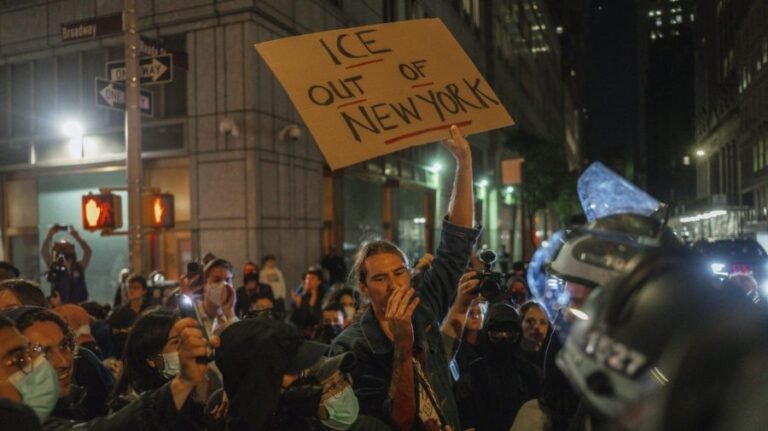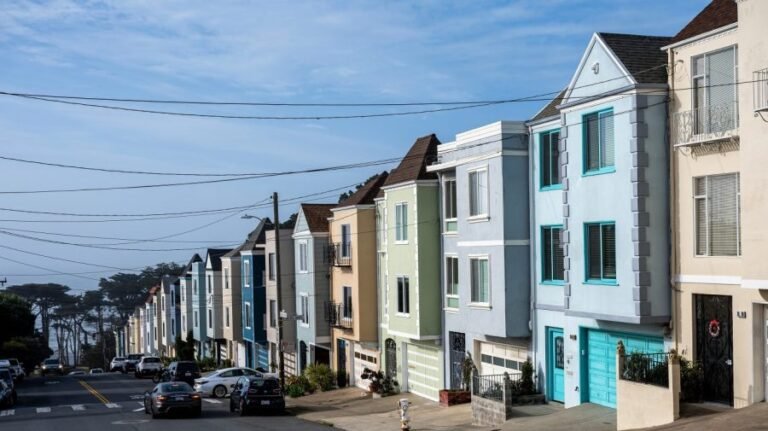
Republican senators are balking at the Trump administration’s decision to cut off transportation funding to Democratic “blue states” such as New York and Massachusetts during the government shutdown, warning that freezing funds as an apparent act of political retaliation is not appropriate.
Republican senators are unified in the view that Democrats are wrong to hold government funding hostage in order to win major health policy concessions, but they feel uncomfortable about halting transportation funding to certain states because they are represented by Democrats in Washington.
Republican members of the Appropriations Committee, in particular, argue that funding decisions should be made on the basis of merit. They think that quashing projects to extract political vengeance, even during the partisan shutdown fight, is a bad idea.
Sen. Lisa Murkowski (R-Alaska) said targeting blue states such as New York by threatening to cut off funding for projects that have been already approved and funded, such as the construction of a new rail tunnel beneath the Hudson River to facilitate travel and commerce between Manhattan and New Jersey, will hurt people in those states regardless of their own political views.
“You show me one blue state in America where you don’t have pockets, maybe even big pockets, of Republicans, of conservatives, of MAGA people, of pro-Trump. Do we not care about them?” she said.
“Are we just saying, ‘If you don’t like it, you should move to a place where you’ve got a Republican governor?’” she added. “It makes no sense. Why are we being punitive? It’s hard enough when the government is not operating as it should be. Let’s not be punitive to Americans just to score political points.”
Murkowski made her comments after President Trump said last week that his administration had “terminated” the rail tunnel under the Hudson, a massive $16 billion construction job known as the Gateway Project.
White House budget director Russell Vought followed Trump’s threat by announcing the administration will be “immediately pausing over $11 billion” in projects in New York, San Francisco, Boston, Baltimore and other Democratic enclaves.
Vought warned that “lower-priority projects” in those states would be considered for cancellation” and explained that the “Democrat shutdown has drained the Army Corps of Engineers” of its ability to manage them.
Asked if Trump’s threat to “terminate” funding for projects such as Gateway in blue states is appropriate, Senate Appropriations Committee Chair Susan Collins (R-Maine) replied: “No.”
Collins on Monday said she does not favor the administration’s plan to halt funding for infrastructure projects primarily in blue states during the shutdown.
“I’m not for that, I’m not in favor of that,” she said.
But Collins faulted Democrats for repeatedly blocking a “clean” House-passed government funding stopgap over the last few weeks.
She also criticized her Democratic colleagues for last week blocking the annual defense appropriations bill, which passed out of committee with a strong 26-3 bipartisan vote in July, and for preventing the Senate and House from entering a conference negotiation on funding bills for military construction, the departments of Veterans Affairs and Agriculture, and the legislative branch.
“What we really need is for the Democrats to be more cooperative in opening government,” she said. “It is very telling last week that they voted against bringing regular appropriations bills to the Senate floor and that they also are blocking the appointment of conferees for the three bills we passed months ago.”
The Trump administration’s decision to halt funding for the Hudson rail tunnel and the Second Avenue Subway in Manhattan appeared intended to hit Senate Democratic Leader Chuck Schumer and House Democratic Leader Hakeem Jeffries, who both live in New York City.
Schumer reacted furiously last week when Trump threatened to terminate the Gateway Project.
“It’s petty revenge politics. And who gets hurt? It’s going to screw over hundreds of thousands of New York and New Jersey commuters, choke off our economy, and kill good-paying jobs,” he fumed on the Senate floor.
Sen. Jerry Moran (R-Kan.) argued that funding authority rests with Congress and that projects should be funded — or defunded — on the basis of their merit, not as acts of political patronage or retaliation.
Asked if he thought it was appropriate to dole out or rescind funds as a matter of political patronage or revenge, Moran replied, “No, I don’t.”
“It is not about what political party, what color your state is associated with, it’s about the value of the project, which is determined by Congress and implemented by the administration,” he said.
The Trump administration is prepared to freeze up to $600 million for two deteriorating bridges that carry millions of vacationers across the Cape Cod Canal every year.
Massachusetts Gov. Maura Healey said the projects were scheduled to move forward with “funding appropriated by a bipartisan Congress and lawfully awarded by the federal government.”
The Army Corps of Engineers is also planning to stop funding for a waterfront park in San Francisco and sewer projects in New York City, according to the White House budget office.
Other states that will see funding halted because of the shutdown include Delaware, Illinois, Maryland, New Hampshire, New Jersey, New Mexico, Oregon and Rhode Island.
Sen. Shelley Moore Capito (R-W.Va.) said punishing blue states by withholding transportation funding that Congress approved on a bipartisan basis in the past could boomerang on Republicans when Democrats control the White House and Congress.
Asked if it’s appropriate to terminate funding in blue states just because they are represented by Democrats in Washington, Capito said: “I wouldn’t think so.”
“The shoe’s going to be on the other foot someday and I don’t think that’s a good precedent to set,” Capito added, acknowledging that the pendulum of power in Washington will likely swing back to Democrats in the future.
She noted former President Obama targeted Republican-led states such as West Virginia when Democrats controlled Washington by cracking down on coal and fossil-fuel production, something that hurt her home state’s economy.
“During the Obama administration, he basically killed my red state,” she said.
Trump gave Democrats a taste of that bitter medicine earlier this month when the Energy Department announced it would terminate nearly $8 billion in grants to support more than 200 clean-energy projects.
Capito pointed out that Republicans live in liberal-leaning states such as New York, too.
Trump himself was a longtime New Yorker and lived for a while in neighboring Connecticut, another liberal state.
“We’re all in need of infrastructure. I don’t think you want to do it on political maneuvering. Maybe it’s trying to pressure [Democrats] to reopen government,” she said.
Senate Majority Leader John Thune (R-S.D.) defended the administration’s tough tactics, arguing that playing politics with transportation dollars only mirrors what he called the Democratic Party’s political calculations behind rejecting a clean seven-week continuing resolution — which triggered the shutdown.
“I don’t think there’s anybody that wins in a government shutdown, but in a government shutdown any administration is going to have their own priorities,” he told reporters Monday.
“Obviously, this administration like any other is going to have to decide where they want to put the money, which programs and priorities and agencies and departments actually get resources and which ones don’t,” he said.
Asked about the concerns from his GOP colleagues that funding decisions should be made on the basis of merit, not politics, Thune responded: “The decision to shut down the government has been made on pure politics.”
“There is no reason this government should be shut down right now,” he said.


